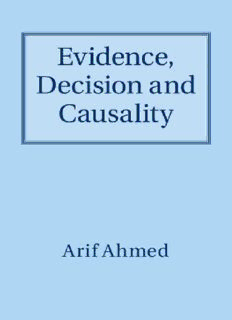Table Of ContentEVIDENCE, DECISION AND CAUSALITY
Mostphilosophersagreethatcausalknowledgeisessentialtodecision-
making: agents should choose from the available options those that
probablycausetheoutcomesthattheywant.Thisbookarguesagainst
thistheoryandinfavourofEvidentialorBayesianDecisionTheory,
whichemphasizesthesymptomaticvalueofoptionsovertheircausal
role. It examines a variety of settings, including economic theory,
quantum mechanics and philosophical thought-experiments, where
causal knowledge seems to make a practical difference. The argu-
mentsmakenoveluseofmachineryfromotherareasofphilosophical
inquiry,includingfirst-personepistemologyandthefree-willdebate.
Thebookalsoillustratestheapplicabilityofdecisiontheoryitselfto
questionsaboutthedirectionoftimeandthespecialepistemicstatus
ofagents.
arif ahmed isSeniorLecturerinPhilosophyattheUniversityof
Cambridge.
EVIDENCE, DECISION
AND CAUSALITY
ARIF AHMED
UniversityofCambridge
UniversityPrintingHouse,Cambridgecb28bs,UnitedKingdom
CambridgeUniversityPressispartoftheUniversityofCambridge.
ItfurtherstheUniversity’smissionbydisseminatingknowledgeinthepursuitof
education,learningandresearchatthehighestinternationallevelsofexcellence.
www.cambridge.org
Informationonthistitle:www.cambridge.org/9781107020894
©ArifAhmed2014
Thispublicationisincopyright.Subjecttostatutoryexception
andtotheprovisionsofrelevantcollectivelicensingagreements,
noreproductionofanypartmaytakeplacewithoutthewritten
permissionofCambridgeUniversityPress.
Firstpublished2014
PrintedintheUnitedKingdombyClays,StIvesplc
AcataloguerecordforthispublicationisavailablefromtheBritishLibrary
LibraryofCongressCataloguinginPublicationdata
Ahmed,Arif.
Evidence,decision,andcausality/ArifAhmed,UniversityofCambridge.
pages cm
Includesbibliographicalreferencesandindex.
isbn978-1-107-02089-4(hardback:alk.paper)
1.Decisionmaking. 2.Evidence. 3.Causation. I.Title.
bd184.a36 2014
122–dc23 2014020933
isbn978-1-107-02089-4Hardback
CambridgeUniversityPresshasnoresponsibilityforthepersistenceoraccuracyof
urlsforexternalorthird-partyinternetwebsitesreferredtointhispublication,
anddoesnotguaranteethatanycontentonsuchwebsitesis,orwillremain,
accurateorappropriate.
Contents
Preface pagevii
Introduction 1
0.1 Causalismandevidentialism 1
0.2 Evidence 3
0.3 Causality 4
0.4 Decisiontheory 5
0.5 EvidentialDecisionTheoryandCausalDecisionTheory 7
0.6 Predestination 9
0.7 Whyitmatters 13
1 Savage 16
1.1 Simplificationsandidealizations 16
1.2 States,events,outcomesandacts 17
1.3 RationalpreferenceandtheSavageaxioms 20
1.4 Frompreferencetoprobability 23
1.5 Utilityandtherepresentationtheorem 26
1.6 Dominanceandfatalism 30
2 EDTandCDT 35
2.1 Preferenceovernewsitems 36
2.2 TheJeffrey–Bolkeraxioms 38
2.3 Credence 40
2.4 EvidentialDecisionTheory 43
2.5 Newcomb’sproblem 46
2.6 K-partitions 48
2.7 CausalDecisionTheory 52
2.8 Mattersarising 54
3 CausalistobjectionstoCDT 60
3.1 Egan–Gibbard 61
3.2 ThePiafmaxim 68
3.3 ObjectiveDecisionTheory 74
v
vi Contents
4 Realisticcases 81
4.1 Remedialcases 82
4.2 Medicalcases 89
4.3 TheTickleDefence 91
4.4 Economiccases 99
4.5 Psychologicalcases 102
4.6 Prisoners’Dilemma 108
5 Deterministiccases 120
5.1 BettingonthePast 120
5.2 BettingontheLaws 130
5.3 Objections 135
5.4 Theopennessofthepast 141
6 Quantum-mechanicalcases 146
6.1 Thedevice 146
6.2 Identicalsettings 148
6.3 Non-identicalsettings 149
6.4 QMversusCDT 155
6.5 Objections 157
7 ThestandardNewcombcase 166
7.1 Deflationaryresponses 166
7.2 TheDiscontinuousStrategy 170
7.3 Thecaseforone-boxing 180
7.4 Thecasefortwo-boxing 194
7.5 Conclusion 211
8 ‘Theultimatecontingency’ 213
8.1 DualismandtheRamseyThesis 215
8.2 ArgumentsfortheRamseyThesis 217
8.3 DynamicinconsistencyandDutchbooks 226
8.4 Anti-dualism 233
References 236
Index 247
Preface
Causality is a pointless superstition. These days it would take more than
onebooktopersuadeanyoneofthat.Thisbookfocusesonthe‘pointless’
bit,notthe‘superstition’bit.Itakeforgrantedthattherearecausalrelations
andaskwhatdoingsoisgoodfor.Morenarrowlystill,Iaskwhethercausal
beliefplaysaspecialroleindecision.Myargumentthatitdoesnotconsists
largelyofschemesforextractingmoneyfromthepeoplewhothinkitdoes.
Iconducttheargumentusingtheframeworkofdecisiontheory.Decision
theoryisconvenientforthispurposebecauseit(a)quantifiescausalbeliefs
and(b)isolatestheirroleinpracticaldeliberation.
Becauseofthisaimthebookcouldn’tserveasastand-aloneintroduction
to decision theory. Anyone who took it that way would find it distorted
andlacunary.Distortedbecauseofthefocusonthedominanceprincipleat
theexpenseofalmosteverythingelsethatSavage’saxiomsentail;lacunary
because of the complete absence from the story of any approach outside
theRamsey–Savageexpected-utilityparadigm.
Anyway,manyexcellentintroductionstothesubjectarealreadyavailable
at various levels of mathematical sophistication. For instance, Peterson
2009 is written at a mathematically elementary level, Gilboa 2009 and
Kreps 1988 are more difficult and Fishburn 1970 is mathematically fairly
advanced. This book presupposes no mathematical knowledge beyond
completelyelementarysettheoryandprobability.
But it probably could function as a philosophical companion to any
such introduction. Its central topic is perhaps the main debate in the
philosophical foundations of decision theory. That subject has a bearing
on more traditional preoccupations of metaphysics, including causality
itself,theasymmetryoftimeandthenatureofself-knowledge.Pursuingit
alsoforcesustotouchuponliveissuesinpsychology,economics,thetheory
of voting and the foundations of quantum mechanics. So I hope in these
chapters to illustrate why the philosophy of decision theory is important,
oratleastinteresting,evenifyouarenotaphilosopherofdecisiontheory.
vii
viii Preface
I owe the reader an apology for the number and the length of the
footnotes. They largely involve (i) references, (ii) numerical calculations
and (iii) objections and clarifications that are unlikely to interest most
readersbutlikelytointerestsome.Incases(ii)and(iii),Ifeltthatincluding
these items in the main text would break up the main thread of the
argument, which you should be able to follow without reading any of
them.
Whilst writing this book I have had the benefit of conversations with,
and/or written comments from, the following people: Helen Beebee,
Sharon Berry, Simon Blackburn, Rachael Briggs, Lucy Campbell, Adam
Caulton,JohnCollins,TomDougherty,AdamElga,LukeFenton-Glynn,
Alison Fernandes, Alexander Greenberg, Alan Ha´jek, Caspar Hare, Jane
Heal,HykelHosni,JennanIsmael,LeonLeontyev,IsaacLevi,HantiLin,
PenelopeMackie,JohnMaier,AdamMorton,DanielNolan,HaroldNoo-
nan, Huw Price, Paolo Santorio, Wolfgang Schwarz, Shyane Siriwardena,
Julia Staffel and Paul Weirich. I thank them all. I also thank two refer-
eesfromthePressfortheirextremelyhelpfulwrittencomments,DrJohn
Gaunt for meticulous copyediting, and Alexander Greenberg and Shyane
Siriwardenaforassistancewiththeindex.AndIthankmyeditorsatCUP,
SarahGreenandHilaryGaskin,fortheirefficiency,patienceandgoodwill.
IamalsogratefultoaudiencesattheAristotelianSociety,theUniversity
of Auckland, the Australian National University, Birmingham University,
BristolUniversity,theUniversityofCambridge,ColumbiaUniversity,the
InstituteofPhilosophy,MonashUniversity,theUniversityofNottingham,
PrincetonUniversity,theScuolaNormaleSuperiorediPisa,theUniversity
ofSheffield,theUniversityofSussexandtheUniversityofSydney,where
Ideliveredtalksonmaterialthathasendedupinthebook.
I wrote some of this book whilst holding a Leverhulme Research
Fellowship at the Faculty of Philosophy, University of Cambridge, and
then at the Sydney Centre for the Foundations of Science, University of
Sydney.IwrotesomeofitwhilstholdingaDistinguishedVisitingProfes-
sorship at the Scuola Normale Superiore di Pisa. And I wrote some of it
whilst holding a Visiting Fellowship at the Research School of Social Sci-
encesintheAustralianNationalUniversity,Canberra.Iamgratefultoall
oftheseinstitutionsfortheirhospitality,andalsototheLeverhulmeTrust.
I also thank the Faculty of Philosophy at the University of Cambridge,
andGirtonCollege,Cambridge,forgrantingmeleavefromteachingand
administrativedutiesinordertofinishthebook.
Material from section 3.1 has appeared in my paper ‘Push the button’,
PhilosophyofScience79(July2012):386–95,andisreproducedbypermission
Description:Most philosophers agree that causal knowledge is essential to decision-making: agents should choose from the available options those that probably cause the outcomes that they want. This book argues against this theory and in favour of evidential or Bayesian decision theory, which emphasises the sym

